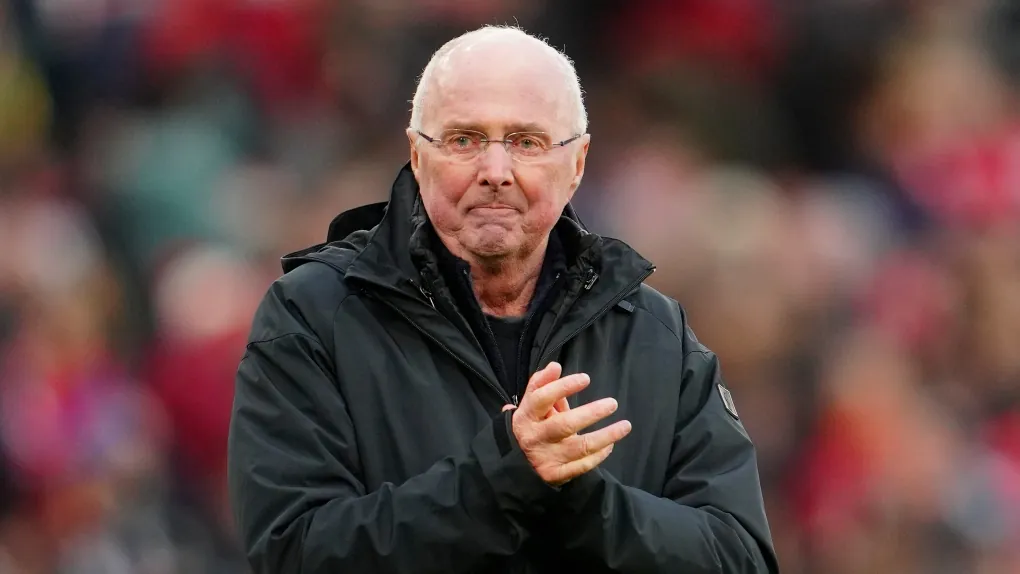Sven-Göran Eriksson, a renowned Swedish football player and manager, passed away at the age of 76 after a battle with cancer. The former England manager had previously opened up about his fight with terminal cancer following a collapse during a run the previous year.
At 75, Eriksson revealed on Sweden’s P1 radio station: “Everyone understands that I have an illness that is not good. Everyone guesses it’s cancer, and it is. But I have to fight as long as I can.”
Eriksson gained widespread recognition for managing teams like Roma, Manchester City, and Mexico, but he became a household name when he took charge of the England squad, achieving significant fame in the world of football management.
Throughout his career, Eriksson accumulated considerable wealth, and his personal relationships often attracted public attention.
This article delves into his life, career, and the enduring legacy he leaves behind in the football world.
Sven Goran Eriksson Biography
Sven-Göran Eriksson was born on February 5, 1948, in Sunne and grew up in Torsby, both located in Värmland, Sweden. His father, also named Sven (born in 1928), worked as a bus conductor, while his mother, Ulla (1926–2011), was employed in a textile store. He earned the nickname “Svennis” after his younger brother Lars-Erik struggled to pronounce his name; in Sweden, Eriksson became widely known and is often referred to by this moniker.
Sven Goran Eriksson Education
Eriksson moved to Säffle to study economics and switched clubs to Sifhälla. In 1972, he joined Karlskoga, a Swedish football Division 2 team, while also working as a physical education teacher in Örebro.
Sven Goran Eriksson Career
Sven-Göran Eriksson began his football career at the age of 16, debuting for Torsby IF in Sweden’s Division 4. As we said above, After studying economics at Säffle and playing for SK Sifhälla, he joined Division 2 club KB Karlskoga FF in 1972, while simultaneously working as a physical education teacher. Eriksson’s playing career as a right-back was unremarkable, so he moved into management and discovered his true passion.
His managerial career began in 1977 with Degerfors IF, signaling the beginning of what would become an extraordinary career in football management. Eriksson rose to fame with IFK Göteborg, leading them to victory in the UEFA Cup in 1982, which earned him international acclaim. This achievement led him opportunities to manage top clubs throughout Europe, including AS Roma, Fiorentina, and Lazio in Italy.
Eriksson’s most successful stint was with Lazio, where he won the Serie A title, two Italian Cups, and the European Cup Winners’ Cup, becoming the first manager to win league and cup doubles in three different countries. Eriksson made history in 2001 when he became the first foreign manager of the England national football team.
Eriksson managed England in 67 games between 2001 and 2006, including two World Cups in 2002 and 2006, as well as Euro 2004, when the squad reached the quarter-finals.
Eriksson has managed a number of well-known clubs, including Manchester City, Leicester City, Roma, and Lazio. Later in his career, he demonstrated his versatility by leading the national teams of Mexico and the Ivory Coast, establishing his place as one of football’s best managers.
Eriksson’s career spans four decades and has seen significant milestones and accomplishments, such as winning the league and cup double with Lazio in 1999/2000 and the European Cup Winners’ Cup. His accomplishments have cemented his status as one of the most renowned and successful managers in football history.
Sven-Göran Eriksson’s Major Honors and Awards
Club Honors:
- UEFA Cup: 1982 (IFK Göteborg)
- European Cup Winners’ Cup: 1999 (Lazio)
- Serie A: 2000 (Lazio)
Individual Awards:
- BBC Sports Personality of the Year Coach Award
Sven Goran Eriksson Net Worth 2024
Sven-Göran Eriksson’s net worth was estimated to be around $35 million at the time of his death in August 2024 at the age of 76, according to various sources. His impressive wealth was amassed over a 40-year career as a football manager, where he secured 17 major trophies with clubs in Sweden, Portugal, and Italy.
Sources –
Sven Goran Eriksson Real Estate
Sven-Göran Eriksson passed away at a luxury £4 million lakeside villa in Sweden. This property, situated on the banks of Lake Fryken, has 12 rooms, a marina, a swimming pool, and six acres of land. Originally built in the 1800s, the mansion was put on the market in 2013 but did not sell, partially due to folklore surrounding its previous resident, including reports of a ghost.
Sven Goran Eriksson Illness and cause of death
Eriksson’s fight against pancreatic cancer was both public and touching, with his diagnosis coming just eight months before his death. The global football community has come together to honor his legacy through tributes, a biographical documentary, and even a symbolic one-day coaching role at Liverpool for a charity match—showcasing the deep respect and affection he earned throughout his career.
Sven Goran Eriksson Personal Life
Sven-Göran Eriksson’s personal life was characterized by significant relationships and public scrutiny. He was married to Ann-Christine Pettersson from 1977 until their divorce in 1994, and they had two children together.
Following his marriage, Eriksson attracted considerable media attention for his high-profile relationships. In 1998, he began a well-known relationship with Italian-American lawyer Nancy Dell’Olio, which lasted several years and was often covered by the press. Eriksson also had affairs with British television presenter Ulrika Jonsson and FA secretary Faria Alam, contributing to a public image that was as much defined by his personal life as his professional achievements.
In his later years, Eriksson found lasting companionship with Yaniseth Alcides, a former dancer from Panama. They lived together in Sweden for over 15 years, with Eriksson describing their home as a peaceful retreat that brought him a sense of calm.
Eriksson’s personal life was frequently in the spotlight, especially during his tenure as England’s manager from 2001 to 2006, a time when the “WAG” culture surrounding footballers’ partners was emerging. He acknowledged that his private life was often anything but private, particularly in England, where the tabloid media closely followed his relationships and scandals.
Sven Goran Eriksson Legacy
Sven-Göran Eriksson’s football journey was as varied as it was successful. From Sweden’s icy fields to the sun-soaked pitches of Mexico and beyond, his strategies and philosophies made a lasting impact on the sport. His legacy is measured not only by the trophies and titles he claimed but also by the countless lives and careers he influenced worldwide. His story is one of victory, adaptability, and an unending passion for football—a narrative that will inspire future generations.

